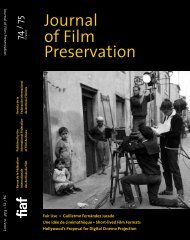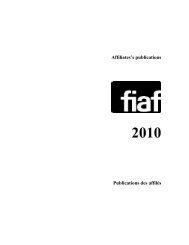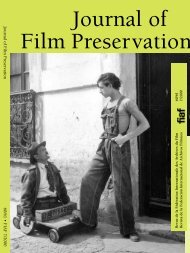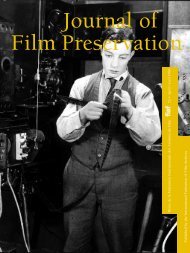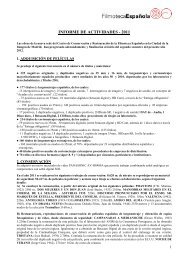Journal of Film Preservation - FIAF
Journal of Film Preservation - FIAF
Journal of Film Preservation - FIAF
You also want an ePaper? Increase the reach of your titles
YUMPU automatically turns print PDFs into web optimized ePapers that Google loves.
during his extended sojourn in the islands, where Murnau lingered<br />
as long as possible, before returning to California and his death.<br />
A recent book by anthropologist Johannes Fabian, “Out <strong>of</strong> Our<br />
Minds: Reason and Madness in the Exploration <strong>of</strong> Central Africa”,<br />
deals with the ethical, moral, and prejudicial baggage European<br />
explorers brought with them to what they typically called “the dark<br />
continent.” Unlike the aforementioned Sir Richard Burton, who<br />
ultimately converted to his own personally mystical brand <strong>of</strong> Islam,<br />
and T. E. Lawrence, who began to believe that he could be more<br />
Arab than the Arabs, most <strong>of</strong> the Europeans maintained a rigidity,<br />
presuming European values to be superior, by definition, to those<br />
they found among the indigenous people.<br />
Part <strong>of</strong> Fabian’s book deals with an encounter<br />
between an 1881 German expedition and a<br />
tribe known as “the children <strong>of</strong> hemp.” These<br />
people had created an entire religion around<br />
hemp-smoking which made hemp, in Fabian’s<br />
words, “a cultural and political symbol capable<br />
<strong>of</strong> creating a sense <strong>of</strong> identity.” As a result <strong>of</strong><br />
this cult, “the children <strong>of</strong> hemp” became<br />
essentially vegetarian, non-violent, and<br />
unashamed <strong>of</strong> their nakedness. Fabian posits<br />
that the Germans’ encounter with the hempsmokers<br />
may have enabled them to<br />
temporarily throw <strong>of</strong>f the shackles <strong>of</strong><br />
European convention and treat the Africans as<br />
people <strong>of</strong> intrinsic worth, in spite <strong>of</strong> their<br />
cultural differences. “By relaxing normal<br />
tensions and perceptions, hemp might have<br />
helped to create a unique zone where the two<br />
could mingle, if distantly.” If this seems<br />
improbable, perhaps we should remember that<br />
the leading visual chronicler <strong>of</strong> the most<br />
rigidly racist and totalitarian regime in<br />
European history, Leni Riefenstahl, has<br />
devoted much <strong>of</strong> her career to the idealization<br />
<strong>of</strong> the African male nude.<br />
It is not for me to argue that Josef von<br />
Sternberg’s depiction <strong>of</strong> Morocco, his exotic tapestry <strong>of</strong> costumes,<br />
customs, and architecture, is accurate or moves beyond stereotype<br />
and caricature. A man whom Sternberg refers to as the Pasha <strong>of</strong><br />
Marrakech did question the director on why he hadn’t paid him a<br />
visit while making the film in his country, or so Sternberg reports in<br />
his autobiography. I cannot vouch for whether Moroccan women<br />
actually followed legionnaires barefoot into the desert, pulling their<br />
goats behind them. In fact, I would be hard-pressed to argue that any<br />
<strong>of</strong> the Moroccan people depicted in Sternberg’s film are more than<br />
decorous objects contributing to the atmosphere. Their only entrance<br />
53 <strong>Journal</strong> <strong>of</strong> <strong>Film</strong> <strong>Preservation</strong> / 63 / 2001<br />
Marlene Dietrich and Gary Cooper in<br />
Morocco, Joseph von Sternberg (1930).<br />
Courtesy <strong>of</strong> the Cinémathèque Suisse, Lausanne




